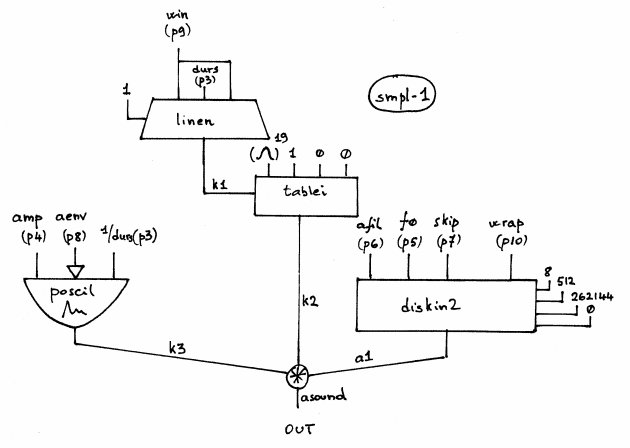Reading from a Sound file with SMPL-1
Tutorial SMPL-1
Name | Description | Default value |
|---|---|---|
amp | Maximum Amplitude. Linear from >0.0 to 1000 or in dB from 0 to -∞ (see Tutorial Getting Started 02 - Amplitude and Internal Editor for more details) | 0.0 |
f0 | Transpose the pitch of input sound by this factor (e.g. 0.5 means one octave lower, 2 is one octave higher, and 1 is the original pitch). Fractional and negative values are allowed (the latter results in playing the file backwards) | 1.0 |
afil | Audio file [name, with possible path, sound, string, pathname or GEN01] | File: santuri_96 |
skip | (Minimum) starting point when reading an audio file [sec] | 0.0 |
aenv | Amplitude Envelope [GEN] | Instance: GEN07 |
win | Attack and decay time in [sec] | 0.01 |
wrap | Wrap flag: 0=locations beyond EOF produce silence, <>0=wrap from beg of file | 1 |
The SMPL-1 Class is a Sampler with the following controls:
- The main ampllitude,
- The transposition factor,
- The starting point of the audio file,
- The amplitude envelope by means of a GEN routine,
- The attack and decay time of the total duration of the amplitude envelope,
- The wrapping mode (enable or disable)
The example A explains the transposition's factor and how to play the audio file backwards (negative values).
The example B focuses on the wrap mode. If the duration required is longer as the audio file with the wrap mode enabled (non zero values) the audio file will restart. Conversely with the wrap mode disabled the audio file will not restart and you get silence.
The example C collects a list of skipping times (in seconds) with the wrapping mode disabled.
The example D realizes 4 different attack and decay times of the amplitude envelope.
It's possible give the audio file in two ways : with the sound class (evaluate and then blocked) or directly with the generic function infile.
For the red patch C#ed and Synt see Appendix A
Inside the Class
instr 1
idur = p3
idurosc = 1/idur
iamp = (p4 > 0.0 ? (p4*0.001) : (10 ^ (p4/20.0)))
; relative amplitude to the sound file (to avoid multiplying twice)
if0 = p5 ; transposition factor
ifile = p6
;ifilepeak filepeak ifile ; take away the semicolons if you want to read the
;print ifilepeak ; max amp of the file on the terminal
iskip = (p7 < 0.0 ? (p7*if0) : p7)
; to make the value not depend on the xposition factor if it's negative
iaenv = p8 ; global amplitude envelope
iwin = (p9 > idur/2 ? idur/2 : p9) ; local envelope
iwout = iwin
ixmode = 1 ; index between 0 and 1
ixoff = 0 ; index offset
ixrap = 0 ; no wraparound in table reading
iwrap = p10
iformat = 8 ; 24-bit int, ignored if the sound file has a header
iwsize = 512 ; the bigger, the better the quality of the transposition
ibufsize = 262144 ; maximum = 1048576, higher makes less disk access
iskipinit = 0 ; do not skip initialization
isigfun = 19 ; sigmoid function
; local envelope (for the grain)
k1 linen 1,iwin,idur,iwout
k2 tablei k1,isigfun,ixmode,ixoff,ixrap
; global envelope
k3 poscil iamp, idurosc, iaenv
; file reading
a1 diskin2 ifile, if0, iskip, iwrap, iformat, iwsize, ibufsize, iskipinit
asound = a1*k2*k3
outc asound
endin
- OMChroma User Manual
- System Configuration and Installation
- Getting started
- Managing GEN function and sound files
- Predefined Classes
- User-fun
- Creating a new Class
- Multichannel processing
- Appendix A - Common Red Patches


